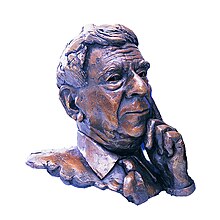Roy Calne
| Sir Roy Yorke Calne | |
|---|---|

A bronze bust by sculptor Laurence Broderick of Sir Roy, outside the main operating theatres at Addenbrooke's Hospital
|
|
| Born | 30 December 1930 |
| Education |
Lancing College Guy's Hospital Medical School |
| Years active | 1959–present |
| Medical career | |
| Profession | Surgeon |
| Specialism | Organ transplantation |
| Notable prizes |
Ernst Jung Prize (1992) Prince Mahidol Award (2002) Pride of Britain Lifetime Achievement Award (2014) |
Sir Roy Yorke Calne, FRCP, FRCS, FRS, is a British surgeon and pioneer in organ transplantation. His most notable achievements are the world's first liver, heart, and lung transplant in 1987; the first successful combined stomach, intestine, pancreas, liver, and kidneycluster transplant in 1994, the first liver transplantation operation in Europe in 1968, and the first intestinal transplant in the U.K. in 1992.
Calne is a fellow of the Royal Society and was Professor of Surgery at Cambridge University between 1965 and 1998 where he initiated the kidney transplant program. He was Harkness Fellow at Harvard Medical School from 1960-61. Much of his subsequent work has been concerned with the improvement of immunosuppression techniques aimed at prolonging the life of liver transplant recipients. He is currently the Yoah Ghim Professor of Surgery at the National University of Singapore.
He was elected to the Royal Society in 1974. He was awarded the 1984 Lister Medal for his contributions to surgical science. The corresponding Lister Oration, given at the Royal College of Surgeons of England, was delivered on 21 May 1985, and was titled 'Organ transplantation: from laboratory to clinic'. He was knighted as Knight Bachelor, in 1986. In 1990 he received the Ellison-Cliffe Medal from the Royal Society of Medicine. His portrait, commissioned by the National Portrait Gallery, was painted by John Bellany in 1991. In 2012, Calne shared the prestigious Lasker Award (Lasker-DeBakey Clinical Medical Research Award) with Dr. Thomas Starzl 'for the development of liver transplantation, which has restored normal life to thousands of patients with end-stage liver disease.'.
...
Wikipedia
